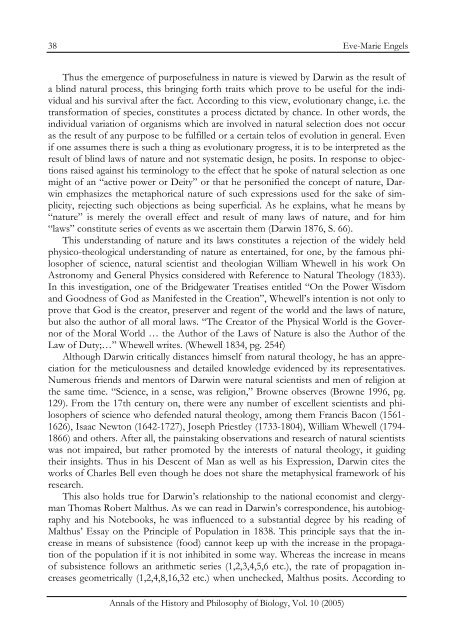Annals of the History and Philosophy of Biology
Annals of the History and Philosophy of Biology
Annals of the History and Philosophy of Biology
Create successful ePaper yourself
Turn your PDF publications into a flip-book with our unique Google optimized e-Paper software.
38<br />
<strong>Annals</strong> <strong>of</strong> <strong>the</strong> <strong>History</strong> <strong>and</strong> <strong>Philosophy</strong> <strong>of</strong> <strong>Biology</strong>, Vol. 10 (2005)<br />
Eve-Marie Engels<br />
Thus <strong>the</strong> emergence <strong>of</strong> purposefulness in nature is viewed by Darwin as <strong>the</strong> result <strong>of</strong><br />
a blind natural process, this bringing forth traits which prove to be useful for <strong>the</strong> individual<br />
<strong>and</strong> his survival after <strong>the</strong> fact. According to this view, evolutionary change, i.e. <strong>the</strong><br />
transformation <strong>of</strong> species, constitutes a process dictated by chance. In o<strong>the</strong>r words, <strong>the</strong><br />
individual variation <strong>of</strong> organisms which are involved in natural selection does not occur<br />
as <strong>the</strong> result <strong>of</strong> any purpose to be fulfilled or a certain telos <strong>of</strong> evolution in general. Even<br />
if one assumes <strong>the</strong>re is such a thing as evolutionary progress, it is to be interpreted as <strong>the</strong><br />
result <strong>of</strong> blind laws <strong>of</strong> nature <strong>and</strong> not systematic design, he posits. In response to objections<br />
raised against his terminology to <strong>the</strong> effect that he spoke <strong>of</strong> natural selection as one<br />
might <strong>of</strong> an “active power or Deity” or that he personified <strong>the</strong> concept <strong>of</strong> nature, Darwin<br />
emphasizes <strong>the</strong> metaphorical nature <strong>of</strong> such expressions used for <strong>the</strong> sake <strong>of</strong> simplicity,<br />
rejecting such objections as being superficial. As he explains, what he means by<br />
“nature” is merely <strong>the</strong> overall effect <strong>and</strong> result <strong>of</strong> many laws <strong>of</strong> nature, <strong>and</strong> for him<br />
“laws” constitute series <strong>of</strong> events as we ascertain <strong>the</strong>m (Darwin 1876, S. 66).<br />
This underst<strong>and</strong>ing <strong>of</strong> nature <strong>and</strong> its laws constitutes a rejection <strong>of</strong> <strong>the</strong> widely held<br />
physico-<strong>the</strong>ological underst<strong>and</strong>ing <strong>of</strong> nature as entertained, for one, by <strong>the</strong> famous philosopher<br />
<strong>of</strong> science, natural scientist <strong>and</strong> <strong>the</strong>ologian William Whewell in his work On<br />
Astronomy <strong>and</strong> General Physics considered with Reference to Natural Theology (1833).<br />
In this investigation, one <strong>of</strong> <strong>the</strong> Bridgewater Treatises entitled “On <strong>the</strong> Power Wisdom<br />
<strong>and</strong> Goodness <strong>of</strong> God as Manifested in <strong>the</strong> Creation”, Whewell’s intention is not only to<br />
prove that God is <strong>the</strong> creator, preserver <strong>and</strong> regent <strong>of</strong> <strong>the</strong> world <strong>and</strong> <strong>the</strong> laws <strong>of</strong> nature,<br />
but also <strong>the</strong> author <strong>of</strong> all moral laws. “The Creator <strong>of</strong> <strong>the</strong> Physical World is <strong>the</strong> Governor<br />
<strong>of</strong> <strong>the</strong> Moral World … <strong>the</strong> Author <strong>of</strong> <strong>the</strong> Laws <strong>of</strong> Nature is also <strong>the</strong> Author <strong>of</strong> <strong>the</strong><br />
Law <strong>of</strong> Duty;…” Whewell writes. (Whewell 1834, pg. 254f)<br />
Although Darwin critically distances himself from natural <strong>the</strong>ology, he has an appreciation<br />
for <strong>the</strong> meticulousness <strong>and</strong> detailed knowledge evidenced by its representatives.<br />
Numerous friends <strong>and</strong> mentors <strong>of</strong> Darwin were natural scientists <strong>and</strong> men <strong>of</strong> religion at<br />
<strong>the</strong> same time. “Science, in a sense, was religion,” Browne observes (Browne 1996, pg.<br />
129). From <strong>the</strong> 17th century on, <strong>the</strong>re were any number <strong>of</strong> excellent scientists <strong>and</strong> philosophers<br />
<strong>of</strong> science who defended natural <strong>the</strong>ology, among <strong>the</strong>m Francis Bacon (1561-<br />
1626), Isaac Newton (1642-1727), Joseph Priestley (1733-1804), William Whewell (1794-<br />
1866) <strong>and</strong> o<strong>the</strong>rs. After all, <strong>the</strong> painstaking observations <strong>and</strong> research <strong>of</strong> natural scientists<br />
was not impaired, but ra<strong>the</strong>r promoted by <strong>the</strong> interests <strong>of</strong> natural <strong>the</strong>ology, it guiding<br />
<strong>the</strong>ir insights. Thus in his Descent <strong>of</strong> Man as well as his Expression, Darwin cites <strong>the</strong><br />
works <strong>of</strong> Charles Bell even though he does not share <strong>the</strong> metaphysical framework <strong>of</strong> his<br />
research.<br />
This also holds true for Darwin’s relationship to <strong>the</strong> national economist <strong>and</strong> clergyman<br />
Thomas Robert Malthus. As we can read in Darwin’s correspondence, his autobiography<br />
<strong>and</strong> his Notebooks, he was influenced to a substantial degree by his reading <strong>of</strong><br />
Malthus’ Essay on <strong>the</strong> Principle <strong>of</strong> Population in 1838. This principle says that <strong>the</strong> increase<br />
in means <strong>of</strong> subsistence (food) cannot keep up with <strong>the</strong> increase in <strong>the</strong> propagation<br />
<strong>of</strong> <strong>the</strong> population if it is not inhibited in some way. Whereas <strong>the</strong> increase in means<br />
<strong>of</strong> subsistence follows an arithmetic series (1,2,3,4,5,6 etc.), <strong>the</strong> rate <strong>of</strong> propagation increases<br />
geometrically (1,2,4,8,16,32 etc.) when unchecked, Malthus posits. According to

















